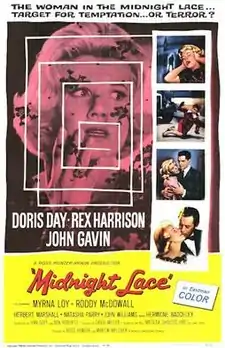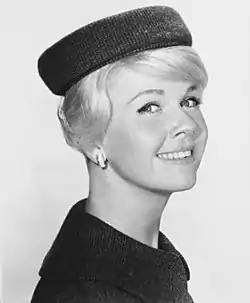Midnight Lace
Midnight Lace is a 1960 American Eastmancolor mystery-thriller film directed by David Miller, and stars Doris Day and Rex Harrison about a woman who is threatened by a stalker. The screenplay by Ivan Goff and Ben Roberts is based on the play Matilda Shouted Fire by Janet Green.
| Midnight Lace | |
|---|---|
 Original theatrical release poster | |
| Directed by | David Miller |
| Produced by | Ross Hunter Martin Melcher |
| Written by | Ivan Goff Ben Roberts |
| Based on | Matilda Shouted Fire (1958 play) by Janet Green |
| Starring | Doris Day Rex Harrison John Gavin Myrna Loy |
| Music by | Frank Skinner |
| Cinematography | Russell Metty |
| Edited by | Leon Barsha Russell F. Schoengarth William Lyon |
Production company | Arwin Productions |
| Distributed by | Universal Pictures |
Release date |
|
Running time | 103 minutes 108 minutes (TCM Print) |
| Country | United States |
| Language | English |
| Budget | $3,500,000[1] |
The film was remade as a television movie by Universal Television in 1981.
Plot
American heiress Kit Preston (Doris Day) and her British businessowner husband Tony (Rex Harrison) live in a wealthy neighborhood of London, in a building undergoing major renovation construction. Returning home in a dense fog, Kit is startled by an eerie, threatening falsetto male voice saying he is inescapably going to kill her; she makes it safely home without having seen the owner of the voice.
Kit begins receiving nasty phone calls and recognizes the same voice, further demeaning her and repeating his intention to kill her but refusing to explain his motive. Understandably, with each call she becomes more distraught. Tony and Kit go to Scotland Yard, but Tony fears that Inspector Byrnes (John Williams) is not taking the case very seriously.
Kit's Aunt Bea (Myrna Loy) arrives for a visit. While she is expecting a call from Bea, a man whom Kit believes is her stalker shows up at the door but at that moment the call comes in; when the man hears Kit asking Bea for help, he disappears.
Tony's assistant Daniel Graham (Richard Ney) notifies Tony that he's been looking at the books of Tony's company, and it appears £1 million ($1.256 million USD in 1960) has been embezzled from the firm. The treasurer Charles Manning (Herbert Marshall) is suspected.
Kit is at a bus stop when she's pushed by an unknown person off the curb in front of the approaching bus but is fortunately OK. Tony takes Kit to the doctor; by this point she is so nervous from the recent events and the fact that there have been no witnesses that, seeing her stress, and suspecting possible hallucinations, the physician suggests a psychiatric consultation.
Another call enters, and the caller announces he is coming to kill Kit. Tony explains his scheme to pretend to leave the residence in order to set a trap to lure and catch the stalker and although terrified to be alone, Kit reluctantly agrees.
Soon after Tony returns, a gunman enters, and in the ensuing struggle, the intruder takes a bullet. However, the stalker's voice is heard, and now the camera shows the voice to be coming from a tape recorder.
Tony now confesses he has been gaslighting Kit with help from his lover in a scheme to drive her insane, kill her, and make the death appear a suicide, with money as the motive. He needs to collect her inheritance to repay the money he embezzled from his company.
Terrified for her life, Kit runs through the balcony high onto the construction site and is rescued by the construction foreman, Brian Younger (John Gavin).
Cast
- Doris Day as Kit Preston
- Rex Harrison as Anthony Preston
- John Gavin as Brian Younger
- Myrna Loy as Aunt Bea Vorman
- Roddy McDowall as Malcolm Stanley
- Herbert Marshall as Charles Manning
- Natasha Parry as Peggy Thompson
- Hermione Baddeley as Dora Hammer
- John Williams as Inspector Byrnes
- Richard Ney as Daniel Graham
- Anthony Dawson as Roy Ash
- Rhys Williams as Victor Elliot
- Richard Lupino as Foster
- Hayden Rorke as Doctor Garver
- Doris Lloyd as the housekeeper Nora Stanley
- Gage Clarke as salesman in gun shop
- Elspeth March as woman
- Peter Adams as man at American Consulate
- Rex Evans as Basil Stafford
Production
The film was based on a play by Janey Green Matilda Shouted Fire. In August 1958 it was touring the provinces in Britain but had not arrived in London when Universal announced they had purchased the screen rights as a vehicle for Doris Day.[2] In March 1959, Ben Roberts and Ivan Goff signed to write the script. The film would be done as a co-production between Universal and Arwin, the company of Day's husband.[3]
In February 1960, the title was changed to Midnight Lace.[4]
Critical reception
The Time critic called the film
another of those recurrent thrillers (Sorry, Wrong Number; Gaslight; The Two Mrs. Carrolls, Julie) in which a dear, sweet, innocent girl is pursued by a shadowy figure of evil who threatens her with all sorts of insidious molestation...Like its predecessors, Midnight Lace is not very interesting in itself, but it is uncomfortably fascinating when considered as one of the persistent fantasies of a monogamous society...False leads trail off in at least seven directions, but the climax of the film will come to most mystery buffs as no surprise...Doris Day wears a lot of expensive clothes, and in attempting to portray the all-American missus behaves like such a silly, spoiled, hysterical, middle-aged female that many customers may find themselves less in sympathy with her plight than with the villain's murderous intentions.[5]
Variety wrote
In a Ross Hunter effort the emphasis is on visual satisfaction. The idea seems to be to keep the screen attractively filled. First and foremost, it is mandatory to have a lovely and popular star of Doris Day's calibre. She is to be decked out in an elegant wardrobe and surrounded by expensive sets and tasteful furnishings. This is to be embellished by highly dramatic lighting effects and striking hues, principally in the warmer yellow-brown range of the spectrum. The camera is to be maneuvered, whenever possible, into striking, unusual positions...The effervescent Day sets some sort of record here for frightened gasps. Harrison Is capable. Director David Miller adds a few pleasant little humorous touches and generally makes the most of an uninspired yarn.[6]
Awards and nominations
Doris Day was nominated for the Golden Globe Award for Best Actress - Motion Picture Drama. Irene Lentz was nominated for the Academy Award for Best Color Costume Design.
Home media availability
Universal first released Midnight Lace on VHS in 1996. In 2014, the film was released on DVD through the Turner Classic Movies Vault Collection, with a 1.85:1 video aspect ratio and bonus features like a special film introduction from TCM, movie trailer (formatted for widescreen), and image stills and photos; this was re-released on March 11, 2015 as a barebone film-only DVD.[7] The film was released by Universal directly as a stand-alone DVD and in the Doris Day: The Essential Collection, which features 5 other films starring Doris Day (Pillow Talk, Lover Come Back, The Thrill of It All, Send Me No Flowers, and The Man Who Knew Too Much); these releases have no bonus features but have optional English subtitles and present the film in a 2.00:1 ratio.[8]
A licensed Blu-ray version was released on June 25, 2019 by Kino International under its subsidiary Kino Lorber Studio Classics. It contains the film in two different widescreen ratios (2:1 and 1.78:1), theatrical trailer (in full screen), film commentary by Kat Ellinger, and optional English subtitles. There are also Region 2 releases for both DVD and Blu-ray.
See also
References
- Steinberg, Cobbett (1980). Film Facts. Facts on File. p. 24.
- Looking at Hollywood: Film of Off-Beat Play Set for Doris Day, Hopper, Hedda. Chicago Daily Tribune 17 Dec 1958: b12.
- USTINOV IS SIGNED FOR 'SUNDOWNERS' New York Times 23 Mar 1959: 27.
- Gina Would Like to Bring Son to U.S., Louella Parsons. The Washington Post, Times Herald, 10 Feb 1960: C7.
- Time review
- "Review:'Midnight Lace'". Variety. December 31, 1959. Retrieved December 31, 2016.
- https://www.amazon.com/Midnight-Lace-Doris-Day/dp/B00IRQDQSW/
- https://www.amazon.com/Doris-Day-Collection-Rock-Hudson/dp/B00ST5TC02/
External links
| Wikimedia Commons has media related to Midnight Lace. |
- Midnight Lace at IMDb
- Midnight Lace at the TCM Movie Database
- Midnight Lace at AllMovie
- Review of film at Variety
- Midnight Lace at Rotten Tomatoes
- Midnight Lace at the American Film Institute Catalog
